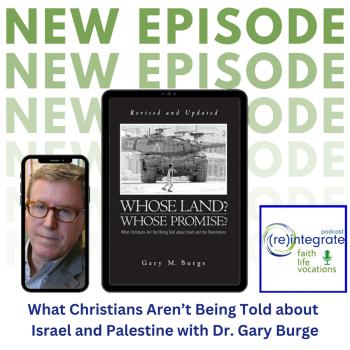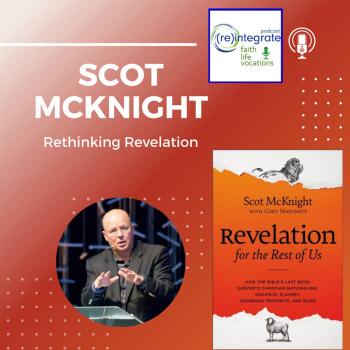 Seventh, and final, post in a series on the Kingdom of God.
Seventh, and final, post in a series on the Kingdom of God.
In my previous posts, I’ve outlined the theological debates over what the kingdom of God is.
Some say it is God’s rule in the hearts of believers, others say it is the rule over the nation of Israel in the future.
Others say it is an already/not yet thing: God rules (already) in the hearts of believers now and will (not yet) rule over everything physically and spiritually in the future. This is the prevailing view among many evangelicals today, influenced by George Eldon Ladd.
Still others say the kingdom of God must be seen exclusively as the people of God ruled by the king, that is, the church. This is the view of Anabaptists, influenced by John Howard Yoder and most recently articulated by Scot McKnight.
But perhaps “kingdom” can have both a particular and a universal definition. Yep, I went there. Both / and. And no, this isn’t a cop-out to appease everyone. It is what the biblical texts lead me to believe.
Cosmic: King of Everything
From the opening chapters of Genesis when God creates everything and then places humans in charge as his image bearers (or vice-regents), we see God as the ruler of everything. The universal rule of God is evident when Scripture proclaims that “God is the King of all the earth” (Psalm 47:7).
Even Nebuchadnezzar was forced to acknowledge that “the Most High rules the kingdom of men and gives it to whom he will” (Daniel 4:25).
It cannot be any clearer:
“The Lord has established his throne in the heavens, and his kingdom rules over all” (Psalm 103:19).
Particular: King of Israel and the Church
But at the same time, Israel was called out of the world to be the particular manifestation of God’s kingdom. Upon their rescue from bondage in Egypt, God told them, “If you will indeed obey my voice and keep my covenant, you shall be my treasured possession among all peoples, for all the earth is mine; and you shall be to me a kingdom of priests and a holy nation” (Exodus 19:5-6).
And this designation is carried over to apply to the New Testament church, for the people of God there are “a chosen race, a royal priesthood, a holy nation, a people for his own possession, that you may proclaim the excellencies of him who called you out of darkness into his marvelous light” (1 Peter 2:9).
In Revelation, Jesus is both the “the ruler of kings on earth” who also loves the particular people of the church, for he “has freed us from our sins by his blood” and “made us a kingdom, priests to his God and Father,” and God the Father is to receive “glory and dominion forever and ever” (Revelation 1:6).
Two Aspects of the Kingdom of God
Old Testament scholar Bruce Waltke writes,
“The Bible bears witness to two forms of God’s kingdom: a universal kingdom and a particular kingdom. By God’s universal kingdom is meant the activity of God (‘elohim: “the transcendent, omnipotent Creator and Sustainer of all things”) in exercising his sovereignty over all things…
By God’s particular kingdom is meant God’s activity in exercising his authority over his subjects who, out of their faith and love for him, serve only him…
Considering these two aspects of God’s kingdom, we see that there is a twofold emphasis on God’s kingship: he is King of all the earth (2 Kings 19:15; Isa. 6:5; Jer. 46:18; Pss. 29:10; 99:1-4) and of his chosen people in particular (Ex. 15:18; Num. 23:21; Deut. 33:5; Isa. 43:15). God allows Satan a limited, but powerful, rule over his universal kingdom to display God’s own spiritual glory through his chosen people (Es. 6:4).
The cosmos, since its creation, displays God’s incommunicable qualities—his eternal power and divine nature (Rom. 1:20)—but not his communicable attributes, such as his justice to all and his grace, mercy, patience, and reliable kindness to his chosen people (cf. Ex. 34:6).”
(Bruce K. Waltke, “The Kingdom of God in the Old Testament: Definitions and Story,” in The Kingdom of God, ed. Christopher W. Morgan and Robert A. Peterson (Wheaton, Ill: Crossway, 2012), pp. 49-51.)
If there are indeed two interconnected but different conceptions of “kingdom” in the Bible, it explains why Christians in the particular kingdom (both personally and in the community of the church) have certain callings within that particular sphere and how they are also to have other extended callings in the culture as well (i.e., their call to do what they must to participate in God’s mission to redeem everything in the world).
Practical Application: Our Work Matters.
If God is the king of both his people and the entirety of the cosmos, then this creates all sorts of callings or vocations for the one submitted to that lordship.
Greg Allison sums it up best:
“The church lives the reality of the inaugurated kingdom by seeking to advance that kingdom wherever the church’s members—the citizens of the kingdom—live, work, and play: in neighborhoods, work-places, governmental agencies, financial establishments, sports programs, and other institutions and structures.
Specifically, the church takes seriously the so-called ‘cultural mandate’ (Gen. 1:28), or the commission enjoined upon all human beings to engage in civilization-building as vice-regents of the King. Accordingly, the church prepares redeemed ‘civilian citizens’ to participate well in human endeavors such as politics, business, the arts, medicine and health care, athletics, science and technology, farming, and economics.”
(Greg R. Allison, “The Kingdom and the Church,” in The Kingdom of God, ed. Christopher W. Morgan and Robert A. Peterson (Wheaton, Ill: Crossway, 2012), p. 200).
Does this both/and construct solve the issues raised by the opposing sides or do we have to push for a more specific definition of the kingdom of God? Over the 2,000+ year history of the church, nobody has uncontestedly proved that definitive understanding of the kingdom of God (we started out this series outlining eight (8!) different definitions of the kingdom!). Is it because we’ve been trying to be too specific or is it because we have not been able to properly interpret the Bible? Where do you finally land in your definition of the kingdom of God?
Image by Cesar Cabrera. Used with permission. Sourced via Flickr.













